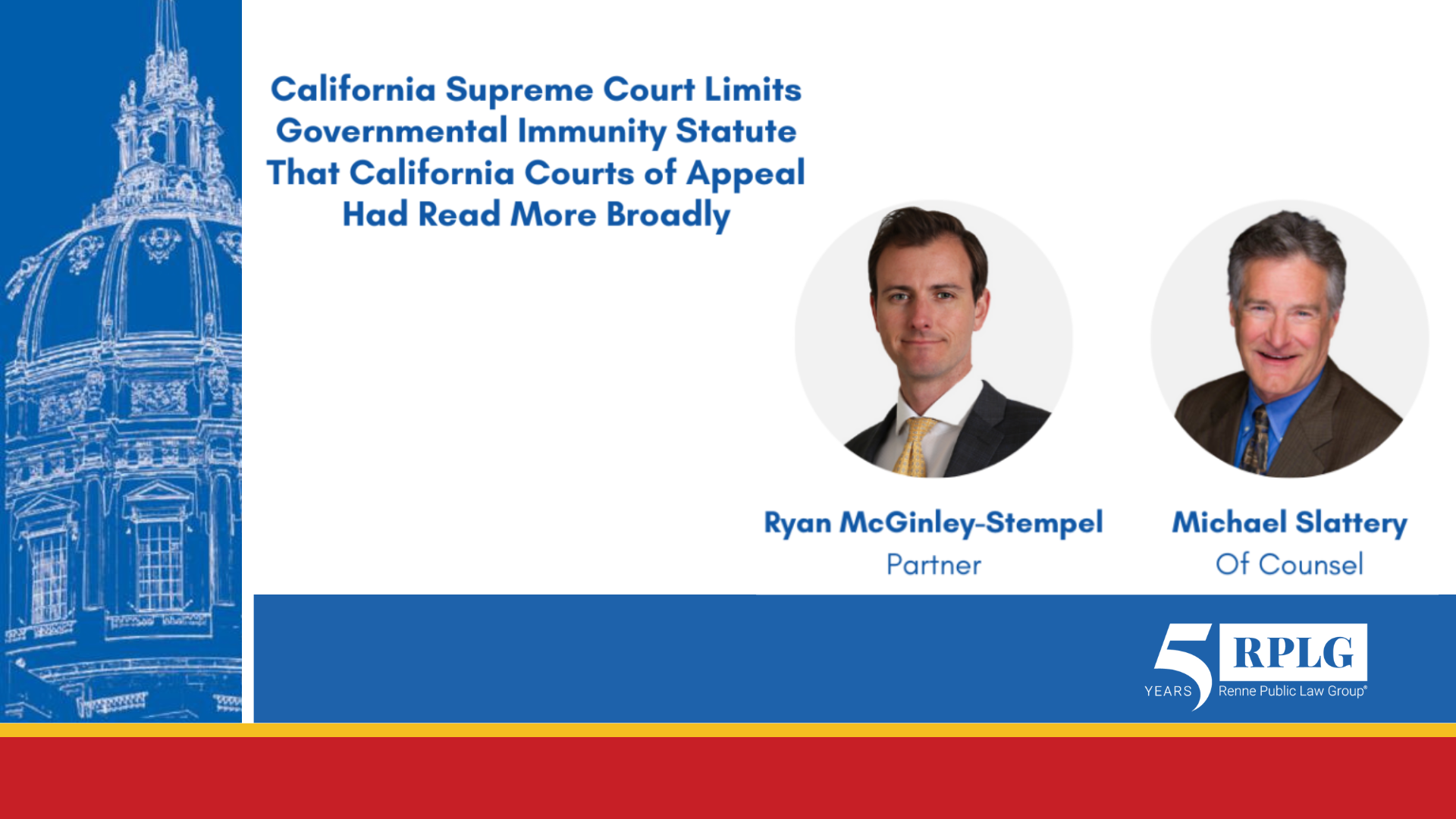 The California Supreme Court recently rejected the Court of Appeal’s broad reading of Government Code section 821.6, which shields public employees acting within the scope of their employment from liability for “instituting or prosecuting any judicial or administrative proceeding” even if the action is “malicious and without probable cause.” The purpose of the statute is to protect public officials from malicious prosecution actions, but the plain language is broad enough to cover other types of tortious conduct.
The California Supreme Court recently rejected the Court of Appeal’s broad reading of Government Code section 821.6, which shields public employees acting within the scope of their employment from liability for “instituting or prosecuting any judicial or administrative proceeding” even if the action is “malicious and without probable cause.” The purpose of the statute is to protect public officials from malicious prosecution actions, but the plain language is broad enough to cover other types of tortious conduct.
For decades, California appellate courts had read the immunity in this statute broadly to encompass tortious conduct that precedes the institution of legal proceedings, including an investigation that may precede the institution of any such proceeding, since investigation is “‘an essential step’ toward the institution of formal proceedings.” Amylou R. v. County of Riverside (1994) 28 Cal.App.4th 1205, 1210. For example, courts have applied the protection to:
- State officials who publicly reported the results of their official investigation of collection agencies and license revocation actions based on those investigations. Citizens v. Capital Corp. v. Spohn (1982) 133 Cal.App.3d 887.
- Department of Social Services supervisors who investigated misconduct and instituted disciplinary proceedings against an employee who was discharged but later reinstated by the Civil Service Commission. Kemmerer v. County of Fresno (1988) 200 Cal.App.3d 1426.
- Police officers who made disparaging comments both to and about a victim in the course of investigating sexual assault. Amylou R. v. County of Riverside (1994) 28 Cal.App.4th 1205.
- Police officers who destroyed data storage discs in the course of executing a search warrant. Baughman v. State of California (1995) 38 Cal.App.4th 182.
- California Highway Patrol officer who negligently lost or destroyed identification information during the investigation of an accident. Strong v. State of California (2011) 201 Cal.App.4th 1439.
- Law enforcement officers who allegedly caused emotional distress to a widow when they failed to cover the body of her deceased husband at a crime scene; actions were part of an investigation which could have led to criminal charges. Leon v. County of Riverside (2021) 64 Cal.App.5th 837
On the other hand, federal courts had limited the immunity to malicious prosecution actions, relying on an older Supreme Court decision concluding that section 821.6 does not shield public officials from false imprisonment claims. (See Garmon v. County of Los Angeles (9th Cir. 2016) 828 F.3d 837.) The Rutter Guide on Public Sector Employment Litigation (which is authored by Renne Public Law Group) summarizes this split of authority. (See Holtzman & Hartinger, Cal. Practice Guide: Public Sector Employment Litigation (The Rutter Group 2023) § 10.265 et seq.)
In Leon v. County of Riverside (S269672; 6/22/23), the California Supreme Court unanimously rejected the broad reading adopted by the intermediate state appellate courts:
“This provision immunizes public employees from claims of injury caused by wrongful prosecution. The question before us is whether, as several Courts of Appeal have held, it also confers immunity from claims based on other injuries inflicted in the course of law enforcement investigations. The answer is no.”
At the same time, the Court declined to read the statute as narrowly as the federal courts, making clear that section 821.6 was not strictly limited to malicious prosecution actions and that “claims of negligence can come within section 821.6” (Slip opn. at p. 12, fn. 3.) As the Court explained, “[t]he immunity is narrow in the sense that it applies only if the conduct that allegedly caused the plaintiff’s injuries was the institution or prosecution of an official proceeding.” (Id. at p. 13.) “But this immunity,” the Court clarified, “is broad in the sense that it applies to every such tort claim, whether formally labeled as a claim for malicious prosecution or not.” (Ibid. [emphasis added].) And critically, in Leon, the plaintiff “claimed no harm resulting from the institution or prosecution of judicial or administrative proceedings—and [] could not conceivably have claimed such harm, because no proceedings were ever instituted.” (Slip opn. at p. 8.)
Nevertheless, the Court took care to add that other immunity provisions may have protected the County:
“It bears some emphasis, however, that section 821.6 is not the only provision of the government Claims Act capable of addressing the concerns the County now raises.”
The Court said the “most significant” of them is Government Code section 820.2, which provides a general immunity for discretionary acts taken within the scope of authority.” Though the Court did not elaborate, the discretionary act at play in Leon could well be the Sheriff’s Department policy not to disturb the body of a deceased until completion of a crime scene investigation.
The Court then added that there are also “more targeted” immunity provisions such as section 820.4 for “any act or omission, exercising due care, in the execution or enforcement of any law” (other than for false arrest or imprisonment) and section 821 for “failure to enforce an enactment.”
Putting aside the other possible immunities available to the County in Leon, our immediate concern is how the Court’s decision in Leon might affect employee discipline proceedings, like the Kemmerer case discussed above—where the Court of Appeal held that supervisors who had investigated misconduct and instituted administrative proceedings to dismiss an employee were entitled to immunity under section 821.6.
Please contact Ryan McGinley-Stempel or Michael Slattery if you have questions about how the opinion might apply to particular situations you are dealing with or anticipate.





